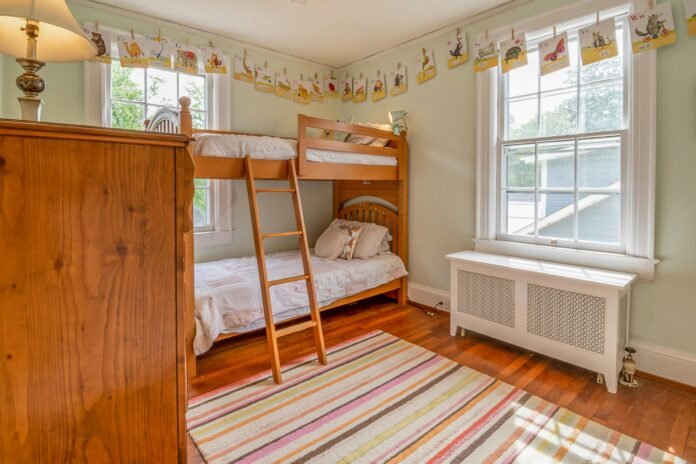Last Updated on August 4, 2024 by Ali Hamza
Bunk beds are a fantastic solution for maximizing space in smaller bedrooms, while also adding a touch of style and fun. Whether you’re designing a kid’s room, a guest room, or a dormitory, choosing the right bunk bed involves considering various factors such as safety, design, and functionality. This guide will help you navigate through the process of selecting the perfect bunk bed for your needs.
Table of Contents
Understanding Your Space and Needs
Before diving into the different styles and features of bunk beds, it’s crucial to assess your specific needs and the space you have available.
Measure the Room
Start by measuring the room where the bunk bed will be placed. Consider the height of the ceiling to ensure there’s enough space for both the top and bottom bunks. You’ll also need to account for any additional furniture and ensure there’s enough room for movement around the bed.
Determine the Purpose
Think about who will be using the bunk bed. Is it for children, teenagers, or adults? Will it be used frequently or just occasionally? Understanding the purpose will help you decide on the right size and features.
Types of Bunk Beds
Bunk beds come in various styles and configurations. Here are some of the most popular types:
Standard Bunk Beds
Standard bunk beds feature two twin-sized beds stacked one on top of the other. This classic design is ideal for saving space in children’s rooms and is usually the most affordable option.
Loft Bunk Beds
Loft bunk beds have a single top bunk, with an open space underneath that can be used for a desk, storage, or a play area. This design is perfect for maximizing space in smaller rooms.
Triple Bunk Beds
For larger families or shared spaces, triple bunk beds offer three sleeping areas in a vertical stack. This design is great for maximizing space in dormitories or vacation homes.
Futon Bunk Beds
Futon bunk beds feature a standard bed on the top and a futon on the bottom, which can be used as a couch during the day and a bed at night. This versatile design is perfect for guest rooms or multipurpose spaces.
Safety Considerations
Safety is paramount when choosing a bunk bed, especially for children. Here are some important safety features to look for:
Sturdy Construction
Ensure the bunk bed is made from high-quality materials like solid wood or metal. Check for a sturdy frame and secure joints to prevent wobbling or collapse.
Guardrails
The top bunk should have guardrails on all sides to prevent falls. The rails should be high enough to accommodate a standard mattress and leave at least five inches of space above the mattress.
Ladder Design
Choose a bunk bed with a secure and easy-to-climb ladder. Some designs feature angled ladders or stairs, which can be safer and more comfortable for younger children.
Style and Design
Bunk beds are available in a wide range of styles and finishes to suit any decor. Here are some tips for choosing a stylish bunk bed:
Match the Room’s Theme
Select a bunk bed that complements the existing decor of the room. Whether you prefer a rustic wooden finish, a sleek metal design, or a colorful painted frame, there’s a bunk bed to match your style.
Customize with Accessories
Personalize the bunk bed with accessories like bedding, curtains, and storage solutions. Adding fun elements like themed bedding or fairy lights can make the bunk bed a cozy and inviting space.
Choosing the Right Mattress
The mattress is a crucial component of a comfortable bunk bed. Here are some tips for selecting the right one:
Size and Thickness
Ensure the mattress fits the dimensions of the bunk bed frame. Typically, a standard twin mattress is used. Avoid thick mattresses that might compromise the safety of the guardrails.
Comfort and Support
Choose a mattress that provides good support and comfort. Memory foam or innerspring mattresses are popular options for bunk beds.
Finding a Reliable Bunk Bed Supplier
When investing in a bunk bed, it’s important to find a reputable bunk bed supplier. Look for a supplier with positive reviews, a wide range of options, and a commitment to safety and quality. Visiting a showroom can also help you get a better sense of the bed’s construction and materials.
Conclusion
Choosing the perfect bunk bed involves balancing style, functionality, and safety. By understanding your space and needs, exploring different types of bunk beds, prioritizing safety features, and selecting the right mattress, you can create a stylish and space-efficient sleeping solution for any room. Don’t forget to find a trusted bunk bed supplier to ensure you get a high-quality product that meets your expectations. Happy bunk bed shopping!



























